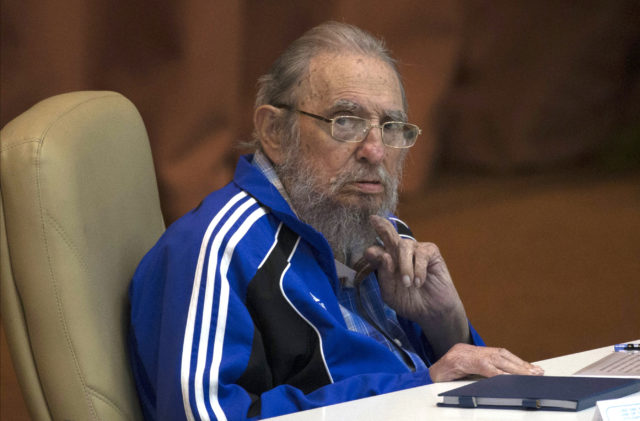By Barbara Slavin
Friday’s death of the world’s last revolutionary icon, Cuba’s Fidel Castro, offers important foreign policy lessons to the incoming administration of Donald Trump.
For nearly 60 years, U.S. administrations struggled to overturn, contain or convert the bearded strongman and export a more democratic, capitalist form of government to the island nation of 11 million people only 90 miles from Key West, FL.

Students stand at attention holding images of Fidel Castro at the university where Castro studied law as a young man, during a vigil in Havana, Cuba, Nov. 27, 2016. Castro, who led a rebel army to improbable victory in Cuba, embraced Soviet-style communism and defied the power of U.S. presidents during his half century rule, died at age 90. (AP)
These efforts – which included the disastrous Bay of Pigs invasion by Cuban exiles after President John F. Kennedy took office and a series of exotic CIA assassination plots – all failed. In ill health, Fidel transferred power to his younger brother, Raúl, a decade ago; a coterie of 50-something acolytes waits for the 85-year-old president to step down in 2018.
A major reason for the longevity of the Castro regime is the U.S. economic embargo. Imposed on Cuba in 1960 after Castro established diplomatic relations with the Soviet Union and nationalized U.S. property, U.S. sanctions — instead of Cuba’s inefficient socialist economic system — became the all-purpose government excuse for low living standards.
Meanwhile, U.S. demonization of Castro burnished his revolutionary credentials and made him an anti-imperialist hero throughout the developing world, inspiring leaders as varied as Hugo Chavez in Venezuela, Palestinian leader Yasser Arafat, South Africa’s Nelson Mandela and Iran’s Ayatollah Ruhollah Khomeini.
As Cubans sank deeper into poverty following the collapse of the Soviet Union, Washington, not Havana, became increasingly isolated in regional and international forums. Year after year, these bodies condemned the United States for restricting Cuba’s access to foreign investment and trade. Meanwhile, the Castro regime maintained its grip over the population, jailing dissidents or encouraging them to make the risky journey by sea to political asylum in Florida.
Arguing that the definition of insanity was to perpetuate failed policies and expect a different result, U.S. President Barack Obama reached an agreement with Cuba in 2014 that included a swap of prisoners. The U.S. and Cuba restored full diplomatic relations in 2015. Obama visited the island this year and lifted as much of the economic embargo as he could without Congressional approval.
U.S. tourists are now returning to Cuba in large numbers, Cuban Americans can visit relatives more easily and send them dollars. Elements of the island’s creaky socialism are moderating and Cubans have increasing, though still limited, access to the Internet and other independent information.
It would be a big mistake for the incoming Trump administration to reverse these positive trends. Yet it appears that may be its intention. In a Monday morning tweet, Trump warned he would terminate the warming U.S. relationship if Cuba doesn’t make a “better deal” for its people, Cuban Americans and the U.S.
If Cuba is unwilling to make a better deal for the Cuban people, the Cuban/American people and the U.S. as a whole, I will terminate deal.
— Donald J. Trump (@realDonaldTrump) November 28, 2016
Speaking on the Fox News Sunday program, White House chief-of-staff designate Reince Priebus said that Raúl Castro must open up Cuba’s economy further and end religious oppression and other human rights abuses to retain diplomatic ties with the United States.
“These things need to change,” Priebus said. “I think the president-elect has been clear on this.”
It is true that Trump campaigned against Obama’s Cuba policy, but that is likely not because of any high-minded interest in human rights, which has scarcely figured in his public stances toward Russia, Turkey, Syria and other authoritarian countries. Instead, Trump was seeking the support of Cuban Americans, an effort that helped him win Florida’s 29 electoral votes and with it, the presidential election.
It is unlikely that Trump will expend much effort seeking to overturn the Cuban government. During the campaign, he expressed skepticism about regime change and nation building and insisted, despite evidence to the contrary, that he opposed U.S. military intervention in both Libya and Iraq.

FILE – In this April 19, 2016 file photo, Fidel Castro attends the last day of the 7th Cuban Communist Party Congress in Havana, Cuba. Fidel Castro formally stepped down in 2008 after suffering gastrointestinal ailments and public appearances have been increasingly unusual in recent years. Cuban President Raul Castro has announced the death of his brother Fidel Castro at age 90 on Cuban state media on Nov. 25, 2016. (AP)
The views of his foreign policy advisers are another matter. His national security advisor-designate Mike Flynn, for example, has argued for regime change in Iran through support of Iranian dissidents.
Flynn and Trump have also talked of dismantling or renegotiating the nuclear agreement with Iran reached by the United States and five other world powers last year. Republicans on Capitol Hill may seek to restore U.S. sanctions against foreign companies that invest in Iran, assuming a Trump White House will not veto such legislation.
If Cuba shows anything, however, it is that unilateral embargoes often isolate the country imposing sanctions more than the intended target. Such sanctions, which hurt ordinary citizens far more than the elite, can also make it harder for opposition movements to gain traction and easier for authoritarian governments to brand dissidents as traitors.
Outsiders can encourage democratic movements but ultimately cannot supplant them. Truth-telling and engagement are likely to show better results than demonization and isolation. In the end, it is up to local populations to change their governments, for better or for worse. That is something on which Trump and Fidel Castro surely would have agreed.
Barbara Slavin is Acting Director of the Future of Iran Initiative at the Atlantic Council in Washington. Follow her on Twitter @barbaraslavin1

